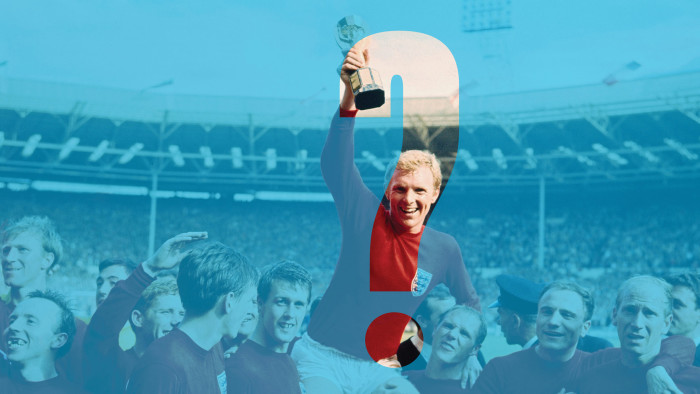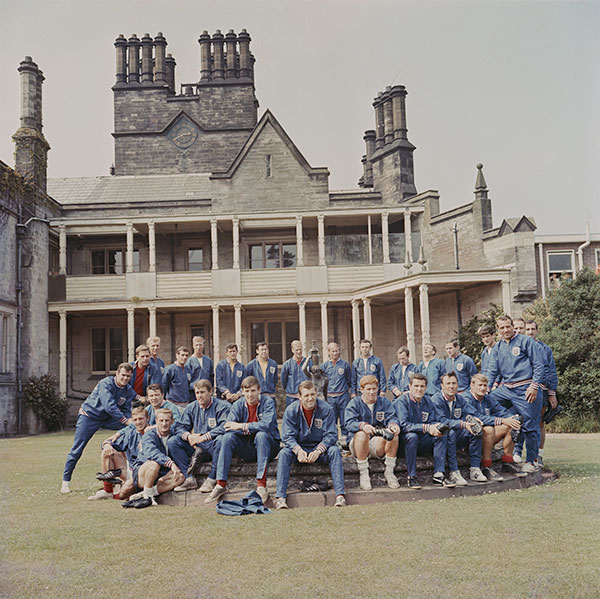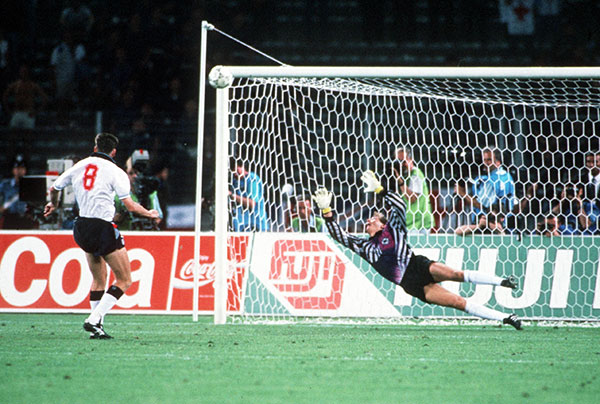Why did England win the World Cup in 1966?

Simply sign up to the Life & Arts myFT Digest -- delivered directly to your inbox.
“Ee-aye-addio, we won the cup!” sing the crowd. England’s captain Bobby Moore climbs the steps to the royal box at Wembley, where a yellow-clad 40-year-old Queen Elizabeth hands him the little gold Jules Rimet trophy. She, he and it all look gorgeous in the London sunshine.
The Technicolor moment in 1966 when England’s football team won their only World Cup is a high point of postwar English history. It also serves as a constant reprimand to the nation’s present. National decline is a powerful notion in modern English history, and England’s failure to win a football tournament since that July day seems to sum up that decline. That’s why the English often turn 1966 into a symbol. The argument then goes that Moore’s “greatest generation” won because they were better men than today’s spoiled overpaid lot. However, if you want to understand why England won then and have lost since, symbolism doesn’t get you very far. In an attempt to demystify 1966, I read the history and crunched data.
Moore’s team obviously benefited from home advantage. But from today’s perspective, we struggle to grasp just how big that advantage was. Sports economist Stefan Szymanski and I calculated that since 1980 home advantage has been worth about two-thirds of a goal per game in international football. That’s enough of an edge to propel a decent team like England — typically about 10th best in the world — to the title.

However, in 1966 home advantage was even greater. Travel then was arduous, referees easily swayed by home crowds, local fans often hostile, and conditions alien. Argentina, a serious contender for victory in 1966, tried to fit in a training session at the England team’s camp in the Shropshire village of Lilleshall but, writes Jonathan Wilson in Anatomy of England (2010), “the plan turned into farce as the Argentina bus got lost, taking two hours to cover the 30 miles from their base near Birmingham”. Then, the evening before their quarter-final against England, Argentina weren’t allowed their mandatory 20-minute practice session at Wembley “on the grounds that it would have interfered with the evening’s greyhound racing”, writes Wilson. (He calculates that they could easily have been fitted in ahead of the dogs.)
Many players who visited England that summer were unused to foreign travel. Argentina’s captain Antonio Rattín told Razón, the local Buenos Aires newspaper, that he listened to a cassette recording of his wife and children 10 times a day. “If I could draw up my own contract for football at this level, I assure you I would put in a clause that said I could only play in Buenos Aires and would never leave my country again.”
The very organisation of the tournament favoured England. The Portuguese star Eusébio always believed that the organisers had illegally moved the England v Portugal semi-final from Goodison Park in Liverpool (where Portugal had come to feel at home) to Wembley (where England had played all their previous games). In fact, Eusébio was wrong: Fifa was free to decide which semi-final would be played at which venue. However, this was exactly the sort of decision that went the hosts’ way.
Most refereeing decisions did too. In England’s 2-0 victory over France, the first goal was “blatantly offside”, writes Niall Edworthy in The Second Most Important Job in the Country (1999), his history of England managers, while the second came after Nobby Stiles “crunched Jacques Simon right under the nose of the referee with a challenge so late that it beggared belief”. The ref ignored the foul, allowing England to go upfield and score, whereupon Simon was stretchered off. A subsequent cartoon in the French newspaper L’Equipe showed England’s midfielder Bobby Charlton driving a Rolls-Royce while referees dressed as British bobbies cleared opponents from his route. Latin American media were less polite.
In the 1966 final, the Azerbaijani linesman Tofiq Bahramov was wrong to award England their third goal when Geoff Hurst’s shot appeared to bounce on the West German goal-line. The point isn’t that later scientific studies showed the ball probably never crossed the line. The point is that Bahramov couldn’t possibly have seen whether it crossed or not. Given the uncertainty, notes Dave Bowler in his 1998 biography of England’s manager Alf Ramsey, Bahramov “had to give the benefit of the doubt to the defending team. His decision was incorrect.” But it’s the kind of decision a linesman makes with a Wembley packed with Union Jacks behind him.
There’s a broader sense in which hosting favoured England. In 1966, two different ethical codes were fighting for dominance in international football: the Latin American and the northern European code. In Latin America, play-acting, shirt-pulling and bullying the ref were considered acceptable but violent fouls weren’t. “In northern Europe, the reverse was true,” writes Bowler. “Histrionics were frowned upon while heavy tackling was part and parcel of a man’s game.” Fifa had said before the World Cup that referees would crack down on violent fouls. However, that didn’t happen. Northern Europe’s code triumphed, probably because the region provided the vast majority of spectators and referees. And so Stiles was free to foul against Uruguay and France, while other Europeans kicked the great Brazilian Pelé out of the tournament.
Latin referees might have given Pelé more protection, helping the bookmakers’ favourites Brazil win their third straight World Cup. Moreover, a Latin referee at England v Argentina might not have sent off Rattín for “the look on his face”, as the West German Rudolf Kreitlein reportedly did. After that match Fifa fined Argentina £85 (the maximum permitted) and threatened to bar the country from the next World Cup. Outraged Latin Americans met while still in London to discuss breaking away and founding their own tournament, wrote Dutch journalist Hans Molenaar in his contemporaneous book on the 1966 World Cup. The Latins must have been particularly irked that England’s cheating (as they saw it) was accompanied by much pompous hot air about “fair play”. In truth, most English people of the day, certain of their moral superiority, probably couldn’t have imagined their team might be cheating. Happily, from the 1970s the game’s two codes converged again.
After the 1970s, hosting lost importance. From 1930 through 1978, hosts won five out of 11 World Cups, while three of the other winning countries shared a border with the host. Since 1982, hosts have won just one trophy out of nine. That is partly because some modern hosts have been weak football nations. But even taking that into account, hosts have done poorly. No post-1978 host, except winners France in 1998, has even reached the final. Spain, Japan and the US didn’t make the quarter-finals, South Africa in 2010 fell in the first round, and Brazil in 2014 were beaten 7-1 by Germany in the semi-final in Belo Horizonte.
The decline in home-field advantage has probably been starkest in international football but the Columbia University psychologist James Curley has identified it in the English domestic game too. His data, written up by the statistical website Fivethirtyeight, show that home teams won about 60 per cent of their league games in the late 19th century but only just over half in the 1960s, and about 40 per cent today.
. . .

England, of course, still deserve credit for winning in 1966. Whether or not they were the best team that summer, they were probably the fittest. Before the tournament, Ramsey had gathered his players for a training camp in Lilleshall and asked them for two months of sacrifice. “Gentlemen,” he added, “if anybody gets the idea of popping out for a pint, and I find out, he is finished with this squad forever.” When the team’s habitual drinkers did hatch a plot to escape “Stalag Lilleshall” for a pint (or more), Ramsey forestalled them. After 11 gruelling days in isolation, England went on a rapid four-match European tour.
Ramsey thought of everything. “The players were even given lessons in how to cut their toenails for fear that a poor clipping technique would lead to a septic toe,” writes Edworthy.
Most other teams in 1966 weren’t so professional. The French team stocked up for their training camp in Scotland with large quantities of French wine. The Argentines on their warm-up tour of Europe smoked straight after friendlies and training sessions, wrote Molenaar. The Swiss midfielder Philippe Pottier actually asked for a week’s leave from training camp to go on holiday. (This was considered a bit slack even for little Switzerland, and he was left at home.)
No wonder England’s left-back Ray Wilson told Bowler: “We were fitter than most teams . . . In the last half-hour we’d generally overcome most sides.” Wilson noted that fitness mattered especially at Wembley, where players often cramped up on the springy turf. Playing every game in London also meant that England didn’t waste any energy travelling.
The statistics seem to confirm the team’s superior fitness. Five of the nine goals that they scored in normal time at the World Cup came in the last 15 minutes of matches. And their fitness must have helped them score those two extra-time goals in the final. George Cohen, the right-back, recalled: “When Alf came out at full-time, he said, ‘Look at the Germans, they’re finished.’ And they were all lying on the floor. Alf made us stand up to show them how fit we were.”
Ramsey himself identified the physical as England’s USP. He said in victory: “We were the fastest and the strongest side in the World Cup, but I do not think we can ever match the individual techniques of the Latin Americans or the Latin Europeans.” Contrast the fitness of 1966 with England’s modern summer fatigue. Now that the Premier League is the most physically demanding league on earth, with 10 months of non-stop football, English players typically arrive at World Cups exhausted. Wayne Rooney, for instance, flopped in South Africa in 2010 after being squeezed like a lemon by his club Manchester United that spring. England’s manager that year, Fabio Capello, later explained why England don’t win summer tournaments: “They’re the least fresh of any of the competing national sides, because their league doesn’t have a break. It’s like when you’re driving a car: if you stop halfway to put fuel in, then you’ll definitely get where you want to go, but if you don’t, there’s always the chance you’ll be running on empty before you reach your goal.”
Other England managers and players this century have offered similar explanations. Angry fans typically dismiss these as excuses. However, Capello’s analysis is backed up by modern England’s unusual scoring patterns. Most goals at World Cups come after half-time. That is natural: in the second half players tire, teams start chasing goals, and gaps open up on the field. But England, in their eight big tournaments from 1998 through 2014, scored 28 of their 45 goals before half-time. England teams nowadays perform like cheap batteries.
England’s fitness in 1966 was to Ramsey’s credit. So were his brave decisions to dispense with wingers mid-tournament, and to pick the relatively obscure Geoff Hurst ahead of the established star Jimmy Greaves in the final. Hurst scored a hat-trick; Ramsey made a difference.
But his side also needed luck. More than in perhaps any other form of mainstream team sport, luck matters in a short football competition. In a football league, played over 38 matches or so, luck tends to even out. One week a referee will mistakenly give your opponents a penalty, but the next week he’ll give it to you. In the end, the best team usually finishes first. But shorter World Cups offer greater scope for randomness. The 1966 tournament lasted just under three weeks. As Arsenal’s manager Arsène Wenger has said about international football tournaments, any team in a league can top the table after three weeks. Over such a brief run, a few inches here and there on a couple of shots can be decisive. England in 1966 beat Argentina in the quarter-final and Portugal in the semi-final by one goal each, and won the final only after extra time. Victory hinged on a few moments. As Jonathan Wilson writes: “One moment can shape a game, and one game can shape a tournament, and one tournament can shape a career. Football is not always fair.”
It’s even less fair and more random than other ballgames. In Test cricket, each batting side has 20 wickets to fall, so an individual dismissal is rarely decisive. Tennis Grand Slams are played over five sets, so a favourite can lose two and still triumph. In basketball and rugby, the team with territorial dominance usually wins. That’s not true in football. Nonetheless, we tend to tell the story of any World Cup with hindsight as if the winners were destined to triumph.

Next, any analysis that compares England in 1966 with later England teams must address the issue of penalty shootouts. Penalties, rather than any lack of moral fibre, may be the single biggest reason why modern England lose. From 1990 through 2014 England played 11 tournaments and were knocked out of six of them on penalties. But in 1966, shootouts didn’t yet exist. If they had, the exhausted West Germans in the final would surely have “parked the bus” in front of their goal in extra time, aiming to hold out for penalties. We can all guess who would have won the shootout.
None of this is to say that England in 1966 were a bad team. Indeed, they were probably slightly better than most subsequent England teams — but only very slightly. The fact is that England in almost any era pretty consistently win about half their games, drawing or losing the rest. Contrary to all popular opinion, it appears that since the 1960s the strength of the England team has barely changed (which would make the vast apparatus of punditry attached to the team redundant). Since the late 1950s, the win percentage has not risen above 70 per cent, and it has never fallen below 67.5 per cent.
The overall picture is one of steady but extremely slow decline, punctuated by two eras of exceptional performance. One of those eras was the late 1960s. The other period of clear improvement runs from the early 2000s through to today.
. . .
It seems that only one period in England’s modern football history can match the late 1960s: namely, the present, as shown by the win percentages of all permanent postwar England managers. Match for match, the only postwar England managers whose stats compare with Ramsey’s (in charge from 1963 to 1974) are the two most recent incumbents: Capello (2008-2012) and current boss Roy Hodgson. It seems that today’s England are unusually strong, perhaps because English internationals now spend their club careers competing with top-class foreign players in the world’s richest league. (This would blow out of the water the popular belief that all those foreign imports have ruined the England team.)
Admittedly the differences between the top few managers in our table are small. In addition, it’s hard to compare eras. Since the break-up of the USSR and former Yugoslavia, England play more small countries such as Estonia and Slovenia. But then Ramsey’s England spent a lot of time playing the little home nations Scotland, Wales and Northern Ireland. Moreover, most of today’s stronger European teams — Spain, France and even Germany — weren’t yet world-beaters in his day. Best practice in football wasn’t nearly as widespread then. In 1966 no German side had ever beaten England. The Germans have outperformed England at every World Cup since.
Ramsey’s supporters will object that he’s the only England manager who (at least in one tournament) won the big games that mattered. It’s true that 21st-century England teams have disappointed in major tournaments. Possibly they lack the never-say-die English spirit of Moore’s men. Alternatively, it may just be that by the time June rolls around, today’s England players are more tired and are playing away.
Perhaps the men of 1966 really were a generation of giants who put all future English footballers to shame. Or perhaps what happened is simply that the fittest, luckiest and most sober team of that summer squeaked a narrow victory in a three-week tournament at home.
A version of this article appears in the book ‘1966 & Not All That’ (Repeater Books), edited by Mark Perryman
Photographs: AP; Popperfoto/Getty Images; Rolls Press/Popperfoto/Getty Images; Hulton Archive/Getty Images; Evening Standard/Getty Images; AFP
Comments